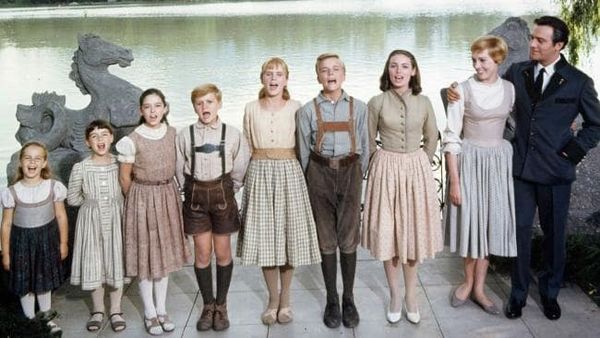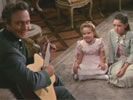Eye For Film >> Movies >> The Sound Of Music (1965) Film Review

Nazis! Julie Andrews! Singing nuns! Yes folks, it's the greatest screen musical of them all, and it's still going strong.
If you don't like The Sound Of Music, the received wisdom goes, you must be some sort of curmudgeonly Scrooge type and probably need to spend some quality time with kittens. But does anything lie beneath the sacred cow, or is the film just a great big singalong cheese fest?

Watching musicals in general entails serious suspension of disbelief. People just do not burst into song, especially not in perfect pitch. If you're looking for realism, look elsewhere. But what good musicals do, they do well - and this one really earns its stripes. The numbers are uplifting, hilarious (intentionally, or not) and infectious. From the spunky nuns clasping their hands and gazing heavenwards, as they try to solve a problem like Maria, to the to-ing and fro-ing of Liesl (Charmian Carr) and Rolfe (Daniel Truhitte) in I Am Sixteen Going on Seventeen. Pure Hollywood gold.
The choreography is stylish, energetic and perfectly executed - witness the famous bike scene in Do Re Mi for just one example. It's easy to see why this film has a following among aficionados of camp culture: it's perfectly crafted, without the slightest hint of irony.
The story in a nutshell (nunshell?) is about Julie Andrews' insanely perky Maria, the bane of the convent for her wild behaviour (manic running across Austrian mountains, compulsive singing). She packs up her trusty guitar and heads to the Von Trapp home, where she will be governess to the widower captain's seven unruly children. Said captain (Christopher Plummer), still mourning the loss of his wife, has become withdrawn, running his home like a military camp and considering marriage to a scheming baroness.
In no time at all Maria turns the children from sullen delinquents into little angels, singing all the way. The captain is entranced and, after a brief Machiavellian turn that sees Maria running back to the convent, the baroness is despatched back to her pied a terre in Vienna and Maria gets her man. The Von Trapps play happy families; Maria becomes Mother and all's right with the world - with the small exception of the Nazis, who want to commandeer the patriotically Austrian captain for their dastardly German navy. As the film closes the entire family have made their escape and are heading for pastures greener (on foot, amazingly).
Boy meets nun, boy loses nun, boy marries nun, boy and nun go on the run. Simple and elegant.
If there is a problem, it's generic. You either love musicals, or you hate them, and if you hate them, no amount of witty lyrics, or political pathos, will redeem the experience of watching one. The Sound Of Music is as perfect an evocation of the form as you're ever likely to see, but some might say the form itself is fundamentally flawed.
The film is unquestionably saccharine. Black and white in its depiction of good and bad (Maria v the baroness; the captain v the Nazis), it also infantilises and sentimentalises the children, as well as casting far too glossy a sheen on what is essentially a real life story of a horrific war experience. But for all that, I challenge you not to sing along when the magnificent Ms Andrews, at the high point of an impressive career, begins to tell you about her favourite things. Marvellous.
Reviewed on: 25 Nov 2005

















